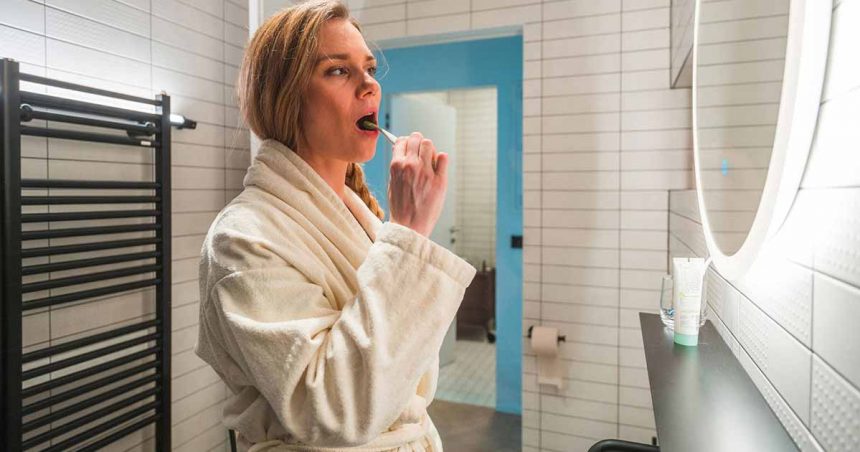Getting good sleep is crucial for our overall health and well-being, but many struggle to achieve it. Surprisingly, one common bedtime habit that may be hindering your sleep is brushing your teeth right before bed. Let’s delve into how this can impact your sleep and explore other tips for improving your sleep hygiene.
The Impact of Brushing Your Teeth Before Bed
While brushing your teeth is essential for dental hygiene, doing it just before bed could actually disrupt your sleep quality. According to sleep expert James Wilson, activities like brushing your teeth and washing your face right before bed can awaken your senses. The bright lights and physical activity involved can stimulate your body and brain, making it harder to fall asleep quickly.1
Wilson suggests completing these tasks earlier in the evening to allow your body to relax before bedtime. By doing so, you can avoid the risk of waking yourself up again after feeling sleepy.
Temperature Control in the Bedroom
Another common mistake people make is adjusting the room temperature too close to bedtime. Certified sleep science coach Claire Davies recommends setting your bedroom temperature between 65-68 degrees Fahrenheit approximately an hour before sleeping. Adjusting the temperature right before bed doesn’t give your room enough time to reach the ideal sleeping temperature, which can disrupt your sleep hygiene and make it difficult to fall asleep.
Maintaining a cooler room helps lower your core body temperature, a key factor in initiating sleep. Being too warm during sleep can lead to frequent awakenings, disrupting your sleep cycle.
The Perils of Last-Minute Phone Checks
Checking your phone before bed is a common habit that can significantly impact your sleep hygiene and quality. The blue light emitted by phone screens can reduce melatonin levels, a hormone essential for regulating sleep. Additionally, engaging in stimulating activities like reading messages or scrolling through social media can keep your brain alert, making it challenging to unwind at the end of the day.
Switching your phone to night mode at least an hour before bed, or better yet, avoiding electronic devices entirely during this time, can help improve your sleep.
Establishing a Relaxing Bedtime Routine
Creating a calming bedtime routine is vital for signaling to your body that it’s time to sleep. A consistent routine helps your body recognize bedtime, making it easier to fall asleep. Here are some suggestions for optimal sleep hygiene:
- Read a book: Opt for a physical book to avoid exposure to blue light.
- Journal: Writing down your thoughts can help clear your mind.
- Listen to soothing music: Relaxing music can aid in preparing for sleep.
- Practice meditation or breathing exercises: Techniques like the 4-7-8 breathing method can reduce stress and promote relaxation.2
Creating an Ideal Sleep Environment
Your sleep environment significantly influences your ability to fall and stay asleep. Here are some tips for optimizing your bedroom:
- Keep it cool: Maintain a room temperature between 60-67°F.
- Reduce noise: Use earplugs or white noise machines to block disruptive sounds.
- Make it dark: Use blackout curtains or an eye mask to eliminate light.
- Ensure comfort: Invest in a supportive mattress and pillows suitable for your sleeping position.
Other Sleep Hygiene Practices
In addition to bedtime routines and an optimal sleep environment, daytime habits also play a crucial role in sleep quality. Here are additional tips for good sleep hygiene:
- Maintain a consistent sleep schedule: Go to bed and wake up at the same time every day.
- Limit caffeine and alcohol: Avoid consuming them close to bedtime.
- Exercise regularly: Engage in moderate aerobic exercise daily.
- Limit naps: Keep them short and avoid late afternoon napping.
Conclusion

Improving your sleep hygiene involves more than just a relaxing bedtime routine; it requires attention to various aspects of your day and the habits and environment you create. Understanding how your evening activities, like brushing your teeth before bed, can impact your sleep quality is essential. Remember, making small adjustments can lead to significant improvements in achieving the restful sleep your body needs.
Sources
- “Sleep experts say brushing your teeth right before bed is a common nighttime routine mistake — here’s why.” MSN. Frances Daniels. 2024.
- “12 Healthy Sleep Hygiene Tips.” Healthline. Erica Hersh. March 27, 2024.
- “Improve Your Sleep Hygiene.” UCSF Health






